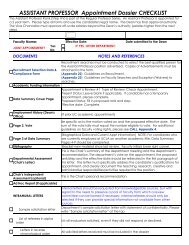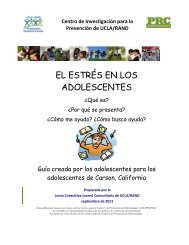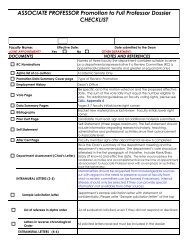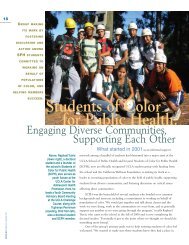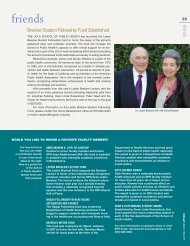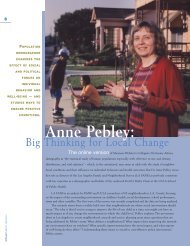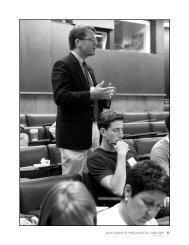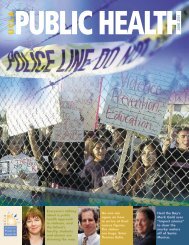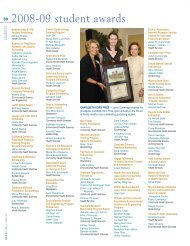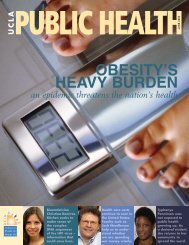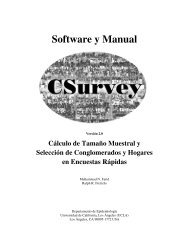Michael C. Lu: - UCLA School of Public Health
Michael C. Lu: - UCLA School of Public Health
Michael C. Lu: - UCLA School of Public Health
You also want an ePaper? Increase the reach of your titles
YUMPU automatically turns print PDFs into web optimized ePapers that Google loves.
10<br />
THE U.S.<br />
RANKS NEAR THE<br />
BOTTOM AMONG<br />
DEVELOPED<br />
COUNTRIES ON<br />
MANY MEASURES,<br />
AND RACIAL/ETHNIC<br />
DISPARITIES IN<br />
PREGNANCY OUT-<br />
COMES PERSIST.<br />
THE OBSTETRICIAN/<br />
GYNECOLOGIST AND<br />
PUBLIC HEALTH<br />
RESEARCHER<br />
PROMOTES A<br />
BROADER AGENDA.<br />
<strong>Michael</strong> C. <strong>Lu</strong>:<br />
Redefining Maternal<br />
and Child <strong>Health</strong><br />
Much has been said about the importance <strong>of</strong> prenatal care in<br />
reducing the risk <strong>of</strong> health problems for both the mother and infant. Dr. <strong>Michael</strong> C. <strong>Lu</strong> believes that’s framing<br />
the issue too narrowly. “Increasingly, we’re learning that by the time a woman becomes pregnant, she<br />
may have already missed a critical window <strong>of</strong> opportunity to give her baby the best start in life,” says <strong>Lu</strong>, an<br />
associate pr<strong>of</strong>essor in both the <strong>UCLA</strong> <strong>School</strong> <strong>of</strong> <strong>Public</strong> <strong>Health</strong> and the David Geffen <strong>School</strong> <strong>of</strong> Medicine at<br />
<strong>UCLA</strong>, who maintains an obstetrics/gynecology practice along with his active research and teaching efforts.<br />
<strong>UCLA</strong>PUBLIC HEALTH<br />
In his book Get Ready to Get Pregnant: Your Complete Prepregnancy Guide to Making a Smart and<br />
<strong>Health</strong>y Baby, <strong>Lu</strong> provides tips on foods to eat and those to avoid, along with strategies to build stress<br />
resilience, give the immune system a “tune-up,” and detoxify one’s environment. “Most women know you<br />
should quit smoking and take 400 micrograms <strong>of</strong> folic acid daily before pregnancy,” he explains. “But there<br />
is a growing body <strong>of</strong> science indicating that there is much more they can do to get ready, and even many<br />
doctors don’t know about that.”<br />
Preconception health is only one part <strong>of</strong> what <strong>Lu</strong> believes should be an even broader agenda. Among<br />
developed countries, <strong>Lu</strong> notes, the United States ranks near the bottom in maternal mortality, in many <strong>of</strong> the<br />
causes <strong>of</strong> infant mortality and in other conditions that affect infant and child health, from overweight and<br />
obesity to early-onset type 2 diabetes. Moreover, <strong>Lu</strong> and others have hypothesized that many <strong>of</strong> the seeds <strong>of</strong><br />
our future health and function – including long-term chronic conditions such as hypertension and heart disease<br />
– are planted inside the womb.<br />
Particularly troubling to <strong>Lu</strong> – and the focus <strong>of</strong> much <strong>of</strong> his research – are racial and ethnic disparities in<br />
pregnancy outcomes. Black infants die at more than twice the rate <strong>of</strong> white infants in the United States, and
have much higher rates <strong>of</strong> low birthweight and<br />
preterm birth. The disparities persist even when<br />
taking into account differences in income and education,<br />
in risk behaviors such as smoking, and in prenatal<br />
care. Possible genetic explanations are being studied<br />
but are unlikely to fully explain these disparities,<br />
<strong>Lu</strong> says. With his <strong>School</strong> <strong>of</strong> <strong>Public</strong> <strong>Health</strong> colleague<br />
Dr. Neal Halfon, director <strong>of</strong> the Center for <strong>Health</strong>ier<br />
Children, Families and Communities, <strong>Lu</strong> has written<br />
about the need to change the paradigm and begin<br />
embracing a life-course perspective. “For decades<br />
we have searched for risk factors during those nine<br />
months <strong>of</strong> pregnancy to explain the disparities, but<br />
we can’t expect prenatal care to eliminate all <strong>of</strong> the<br />
disadvantages and inequities that accumulate over the<br />
life course,” <strong>Lu</strong> says. “We have to do much more –<br />
not just in healthcare but also in policy – to create<br />
conditions in which all mothers and babies can<br />
be healthy.”<br />
Since childhood, <strong>Lu</strong> has wanted to be a physician –<br />
but one who, beyond seeing patients, would through<br />
research and policy address broader health and social<br />
justice issues affecting the population. His determination<br />
to make an impact on the lives <strong>of</strong> society’s<br />
less fortunate members is rooted in his upbringing.<br />
<strong>Lu</strong> was born in Taiwan to parents who weren’t<br />
afforded the opportunity to attend college – his<br />
mother never got past fifth grade, dropping out to<br />
support her family through factory work after her<br />
father died. “My parents worked hard to put food<br />
on the table and still managed to get their four children<br />
through college,” <strong>Lu</strong> says. “They taught me<br />
about making a difference in the world.”<br />
With ambitions in both medicine and public<br />
health, he graduated from Stanford and enrolled<br />
in the M.D./M.P.H. program <strong>of</strong>fered jointly by UC<br />
Berkeley and UC San Francisco. In 1990, while still<br />
in graduate school, <strong>Lu</strong> and several other medical<br />
students established the Suitcase Clinic, taking their<br />
medical equipment to homeless people in the community<br />
and <strong>of</strong>fering to provide care for them, under<br />
faculty supervision. In launching the clinic, <strong>Lu</strong> and<br />
others quickly learned a lesson in public health:<br />
“We realized that the homeless population faced<br />
a constellation <strong>of</strong> problems, <strong>of</strong> which healthcare<br />
might not be the highest priority,” <strong>Lu</strong> recalls.<br />
So his group expanded the model, bringing in<br />
students and faculty from the law school to provide<br />
legal counseling; from the psychology department<br />
to provide crisis intervention services; and from the<br />
optometry school to provide vision care. Other<br />
volunteers were brought in, from chiropractors to<br />
beauticians. Nearly two decades later, the Suitcase<br />
Clinic continues to operate, having served tens <strong>of</strong><br />
thousands <strong>of</strong> homeless and indigent individuals<br />
and, just as important to <strong>Lu</strong>, engaging graduate and<br />
undergraduate students in the process. “My hope<br />
is that it really changes students’ hearts and minds<br />
about what healthcare pr<strong>of</strong>essionals and people in<br />
public health can do to make a difference,” <strong>Lu</strong> says.<br />
When he chose obstetrics/gynecology as his<br />
specialty, he figured he would be a champion for<br />
prenatal care. But <strong>Lu</strong> says his public health grounding<br />
led him to question whether focusing on prenatal<br />
care was enough to make a difference in improving<br />
the health <strong>of</strong> mothers and infants at the population<br />
level. “Not to discount the importance <strong>of</strong> prenatal<br />
care, but I think we can do better,” says <strong>Lu</strong>, voted<br />
one <strong>of</strong> the Best Doctors in America since 2005.<br />
<strong>Lu</strong> is currently involved in several large<br />
studies that he hopes will shed light on strategies<br />
for improving maternal and child health and eliminating<br />
disparities. He is a lead investigator in Los<br />
Angeles County for the congressionally funded<br />
National Children’s Study, which will follow a representative<br />
sample <strong>of</strong> 100,000 children from before<br />
birth to age 21 in an effort to better understand the<br />
causes and identify prevention strategies for major<br />
childhood disorders such as autism, obesity, diabetes<br />
and asthma. He is the principal investigator <strong>of</strong> the<br />
Los Angeles Mommy and Baby Survey, a joint<br />
effort between <strong>UCLA</strong> and the Los Angeles County<br />
Department <strong>of</strong> <strong>Public</strong> <strong>Health</strong> to conduct a detailed<br />
survey <strong>of</strong> the determinants <strong>of</strong> birth outcomes in the<br />
county, including potential community-level effects.<br />
He leads one <strong>of</strong> five sites in the National Institutes <strong>of</strong><br />
<strong>Health</strong>-funded Community Child <strong>Health</strong> Network,<br />
which is taking a community-based participatory<br />
research approach to studying the causes <strong>of</strong> maternal<br />
and child health disparities. And he heads the<br />
Maternal Quality Indicators project, a collaboration<br />
among <strong>UCLA</strong>, several other institutions and the<br />
California Department <strong>of</strong> <strong>Public</strong> <strong>Health</strong> to develop<br />
a statewide system for monitoring and improving<br />
the quality and safety <strong>of</strong> maternity in California.<br />
If his parents get much <strong>of</strong> the credit for <strong>Lu</strong>’s<br />
drive to make a difference in the lives <strong>of</strong> large numbers<br />
<strong>of</strong> people through public health, having two<br />
children <strong>of</strong> his own – daughters Sasha and Avery,<br />
now 6 and 3 – made the goal that much more personal.<br />
“When my wife and I were considering pregnancy,<br />
it made me start to think harder about what<br />
I can do as a father to ensure the best start for my<br />
children,” <strong>Lu</strong> says. “Every day, my girls inspire me to<br />
do my best on behalf <strong>of</strong> maternal and child health.”<br />
“We have to<br />
do much more<br />
— not just in<br />
healthcare but<br />
also in policy<br />
— to create<br />
conditions<br />
in which all<br />
mothers and<br />
babies can<br />
be healthy.”<br />
—Dr. <strong>Michael</strong> C. <strong>Lu</strong><br />
11<br />
faculty pr<strong>of</strong>ile <strong>UCLA</strong>PUBLIC HEALTH



